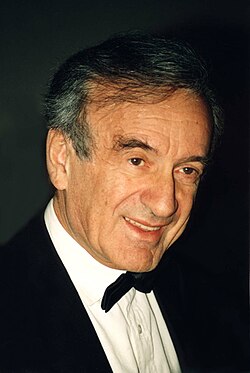Elie Wiesel Quote
But because of his telling, many who did not believe have come to believe, and some who did not care have come to care. He tells the story, out of infinite pain, partly to honor the dead, but also to warn the living - to warn the living that it could happen again and that it must never happen again. Better than one heart be broken a thousand times in the retelling, he has decided, if it means that a thousand other hearts need not be broken at all. (vi)
Elie Wiesel
But because of his telling, many who did not believe have come to believe, and some who did not care have come to care. He tells the story, out of infinite pain, partly to honor the dead, but also to warn the living - to warn the living that it could happen again and that it must never happen again. Better than one heart be broken a thousand times in the retelling, he has decided, if it means that a thousand other hearts need not be broken at all. (vi)
Related Quotes
About Elie Wiesel
Eliezer "Elie" Wiesel (September 30, 1928 – July 2, 2016) was a Romanian-born American writer, professor, political activist, Nobel laureate, and Holocaust survivor. He authored 57 books, written mostly in French and English, including Night, which is based on his experiences as a Jewish prisoner at Auschwitz and Buchenwald during the Holocaust.
As a political activist, Wiesel became a regular speaker on the subject of the Holocaust and remained a strong defender of human rights during his lifetime, advocating for justice in numerous causes around the globe, including that of Soviet Jews and Ethiopian Jews, South African apartheid, the Rwandan genocide, the Bosnian genocide, the War in Darfur, the Kurdish independence movement, the Armenian genocide, Argentina's Desaparecidos, Nicaragua's Miskito people, the Sri Lankan Tamils, and the Cambodian genocide. He was also an outspoken advocate for Israel and frequently weighed in to support the country during escalations of the Arab–Israeli conflict and throughout the Iran–Israel proxy conflict, while also hosting direct talks to facilitate the Israeli–Palestinian peace process.
Wiesel was a professor of the humanities at Boston University, which created the Elie Wiesel Center for Jewish Studies in his honor. He received a number of awards, including the Nobel Peace Prize in 1986. He was a founding board member of the Human Rights Foundation and remained active in it throughout his life. Wiesel was one of the main figures who spearheaded the establishment of the United States Holocaust Memorial Museum in 1993.
As a political activist, Wiesel became a regular speaker on the subject of the Holocaust and remained a strong defender of human rights during his lifetime, advocating for justice in numerous causes around the globe, including that of Soviet Jews and Ethiopian Jews, South African apartheid, the Rwandan genocide, the Bosnian genocide, the War in Darfur, the Kurdish independence movement, the Armenian genocide, Argentina's Desaparecidos, Nicaragua's Miskito people, the Sri Lankan Tamils, and the Cambodian genocide. He was also an outspoken advocate for Israel and frequently weighed in to support the country during escalations of the Arab–Israeli conflict and throughout the Iran–Israel proxy conflict, while also hosting direct talks to facilitate the Israeli–Palestinian peace process.
Wiesel was a professor of the humanities at Boston University, which created the Elie Wiesel Center for Jewish Studies in his honor. He received a number of awards, including the Nobel Peace Prize in 1986. He was a founding board member of the Human Rights Foundation and remained active in it throughout his life. Wiesel was one of the main figures who spearheaded the establishment of the United States Holocaust Memorial Museum in 1993.
